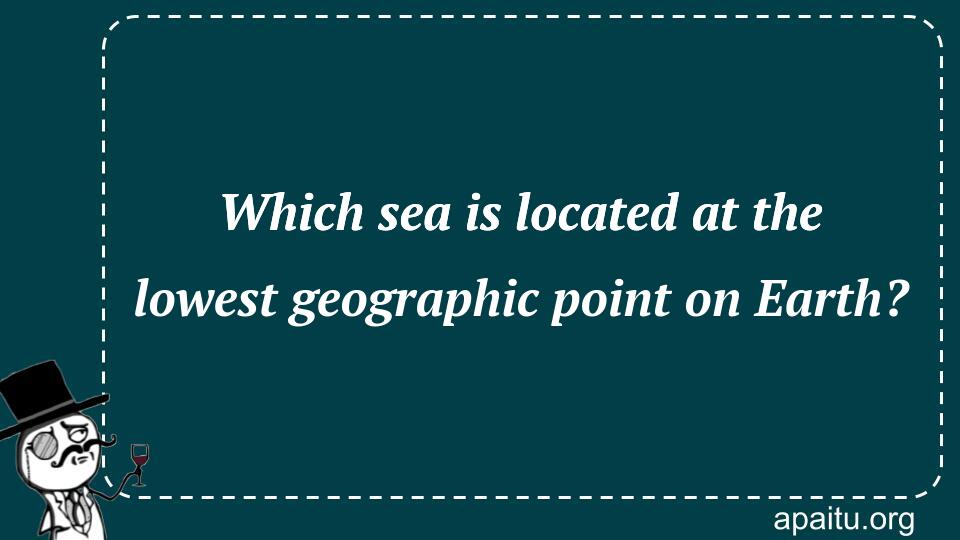Question
Here is the question : WHICH SEA IS LOCATED AT THE LOWEST GEOGRAPHIC POINT ON EARTH?
Option
Here is the option for the question :
- Caspian Sea
- Red Sea
- Black Sea
- Dead Sea
The Answer:
And, the answer for the the question is :
Explanation:
The Dead Sea is the lowest geographic point on Earth’s landmasses, with elevations ranging from 1,300 to 1,400 feet below sea level. It also has many other unusual geological qualities, such as being one of the saltiest bodies of water on the planet, which is said to benefit bathers’ complexion.

The Dead Sea, a remarkable body of water nestled between Jordan to the east and Israel and Palestine to the west, holds the distinction of being located at the lowest geographic point on Earth. This unique saltwater lake, renowned for its high salinity and therapeutic properties, captivates the imagination with its extraordinary natural features and historical significance. In this article, we delve into the wonders of the Dead Sea, exploring its geological origins, the factors contributing to its high salinity, its ecological importance, and its allure as a popular tourist destination.
The Dead Sea’s status as the lowest geographic point on Earth is a result of its depression within the Earth’s crust. Situated approximately 430 meters (1,410 feet) below sea level, it forms part of the Great Rift Valley, a vast geological rift that stretches for thousands of kilometers from northern Syria to Mozambique in southeastern Africa. The Dead Sea owes its unique position to the tectonic forces that shaped the Earth’s crust over millions of years.
One of the distinctive features of the Dead Sea is its remarkably high salt concentration. It is one of the saltiest bodies of water in the world, with a salinity level nearly ten times higher than that of the ocean. The intense evaporation caused by the region’s extreme heat and low humidity, combined with the absence of any outlet for freshwater, leads to a continuous increase in salt concentration. As water evaporates, minerals and salts become more concentrated, resulting in the formation of mineral-rich mud and unique salt formations.
The high salinity of the Dead Sea has significant ecological implications. The extreme conditions make it inhospitable for most forms of marine life, hence the name “Dead” Sea. However, the sea’s unique composition supports the survival of certain salt-loving microorganisms and bacteria. Additionally, the surrounding arid landscapes are home to specialized flora and fauna that have adapted to the harsh environment. These ecological adaptations contribute to the delicate balance of life in the region.
Beyond its geological and ecological significance, the Dead Sea has captivated humans for thousands of years. Known for its therapeutic properties, the sea’s mineral-rich mud and saltwater have been sought after for their potential health benefits. The Dead Sea’s mud is rich in minerals such as magnesium, potassium, calcium, and bromine, which are believed to have therapeutic effects on various skin conditions, arthritis, and respiratory ailments. As a result, the area has become a popular destination for wellness tourism, attracting visitors from around the world.
The unique geographical and geological features of the Dead Sea have also played a role in shaping the region’s cultural and historical heritage. The area surrounding the sea is rich in archaeological sites, including the ancient cities of Sodom and Gomorrah, which are mentioned in biblical accounts. The historical significance of the Dead Sea is further enhanced by the presence of the ancient fortress of Masada, a UNESCO World Heritage Site that stands as a symbol of Jewish resistance against Roman occupation.
In recent years, the popularity of the Dead Sea as a tourist destination has continued to grow. Visitors flock to its shores to experience the buoyancy of the water, which allows them to effortlessly float on its surface due to the high salt content. The mud, believed to have skin-rejuvenating properties, is often used for therapeutic treatments and cosmetic purposes. The breathtaking scenery, with its stark desert landscapes and the sea’s otherworldly blue hues, adds to the allure of the region.
the Dead Sea holds the distinction of being located at the lowest geographic point on Earth. Its geological origins, high salinity, ecological importance, and cultural significance make it a truly remarkable natural wonder. The therapeutic properties of its mineral-rich mud and saltwater, coupled with its stunning landscapes, have made the Dead Sea a sought-after destination for wellness and leisure travelers. As we marvel at the wonders of this unique saltwater lake, we are reminded of the Earth’s diverse and awe-inspiring natural landscapes.